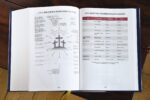The Beginning of the Church

The Gospel of Luke chronicled the life and teaching of Jesus, through His death, resurrection, and ascension. Jesus taught the disciples by word and deed the truth necessary to carry on His work. On the cross, He finished the work of redemption, but He had only started the proclamation of its glories. Also written to Theophilus, the book of Acts gives an account of the life and work of the leaders of the early church.
The Acts of the Holy Spirit
The Spirit was the source and power of Jesus’ earthly ministry and of the apostles’ service. The Greek word translated “Acts” was often used to describe the achievements of great men. Acts does feature the notable figures in the early years of the church, especially Peter and Paul. But the book could more properly be called “The Acts of the Holy Spirit through the Apostles,” since His sovereign, superintending work was far more significant than that of any man. It was the Spirit’s directing, controlling, and empowering ministry that strengthened the church and caused it to grow in numbers, spiritual power, and influence.
The World of the Early Church
As Luke made clear in the prologue to his gospel, he wrote to give Theophilus (and the others who would read his work) a “narrative of those things” (Luke 1:1) which Jesus had accomplished during His earthly ministry. Accordingly, Luke wrote in his gospel “and orderly account” (Luke 1:3) of those momentous events. Acts continues that record, noting what Jesus accomplished through the early church. Beginning with Jesus’ ascension, through the birth of the church on the Day of Pentecost, to Paul’s preaching at Rome, Acts chronicles the spread of the gospel and the growth of the church.
Living the Great Commission
As the first work of church history ever penned, Acts records the initial response to the Great Commission (Matthew 28:19-20). It provides information on the first 3 decades of the church’s existence – material found nowhere else in the New Testament. Though not primarily a doctrinal work, Acts nonetheless emphasizes that Jesus Jesus of Nazareth was Isreal’s long-awaited Messiah, shows that the gospel is offered to all men (not merely the Jewish people), and stresses the work of the Holy Spirit (mentioned more than 50 times). Acts also makes frequent use of the Old Testament.
Acts abounds with transitions: from the ministry of Jesus to that of the apostles; from the Old Covenant to the New Covenant; from Israel as God’s witness nation to the church (composed of both Jews and Gentiles) as God’s witness people. The book of Hebrews sets forth the theology of the transition from the Old Covenant to the New; Acts depicts the New Covenant’s practical outworking in the life of the church.
###
This article contains content from the MacArthur Study Bible, 2nd Edition.



















